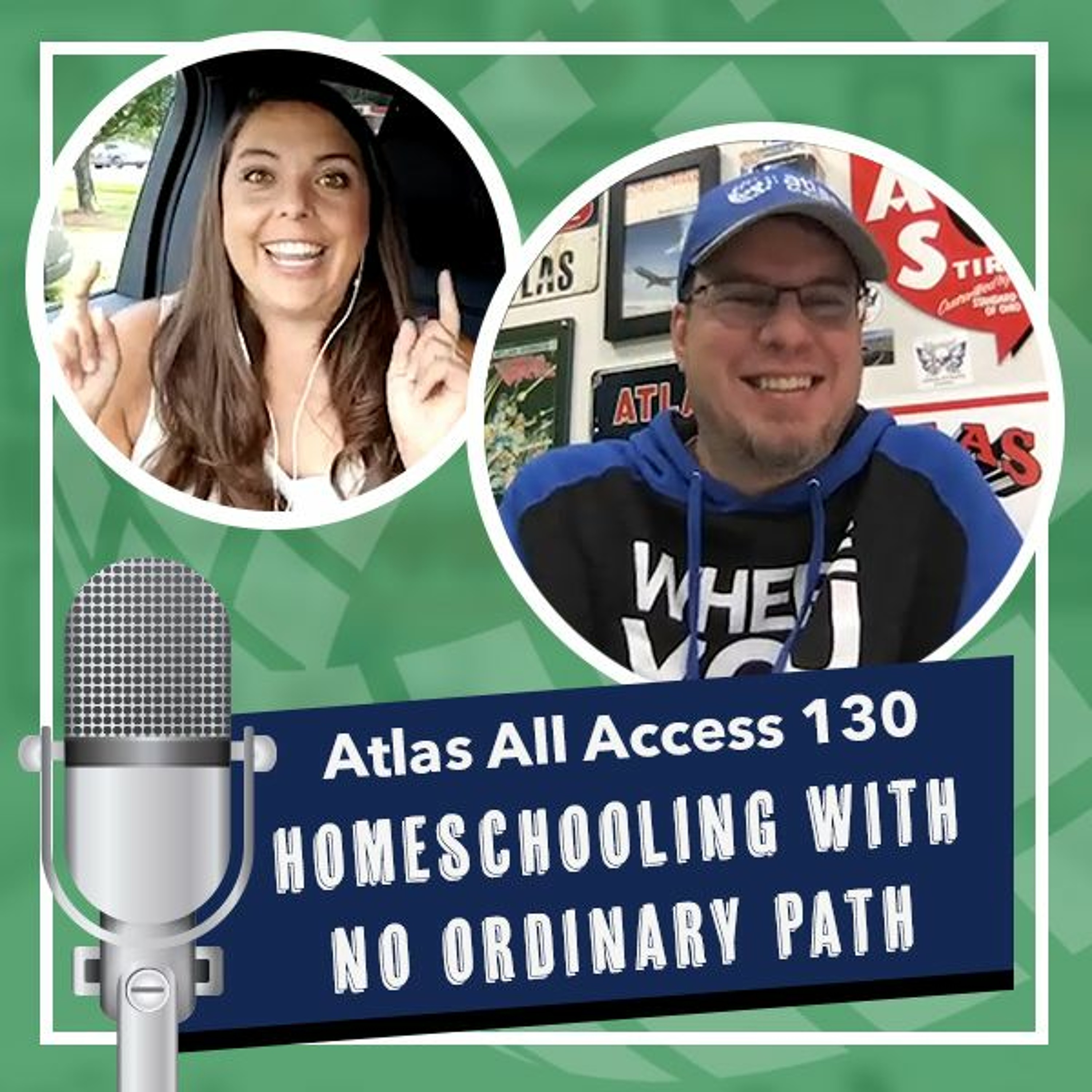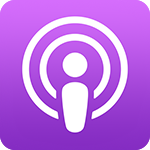
How to homeschool with No Ordinary Path - Atlas All Access 130
08-13-2020
With so many people trying to figure out how to homeschool for the first time, we talked with a pro.
Learn from a travel nurse family how they have tackled homeschooling, how every day can be an adventure (or challenge), and how there's always an opportunity to learn.
A classroom setting has its pros and cons, but any place can be a learning lesson.
As many of us try to figure out the "new normal" for the school year, here are some quick tips to keep in mind when you consider homeschooling or remote learning.
And for more great tips like this, check out our friends at "No Ordinary Path" on YouTube
>> https://tinyurl.com/qq54d4g
Rich Smith: So the school year is starting. Not a typical school year obviously. Nothing's been typical this year, right? If I had a nickel, well, I've used that analogy a lot. So, on this episode, I talk to Kristin Farnsworth, who has been homeschooling her kids, her three kids, while her husband, who is a travel nurse, has been on the road for the past two years. She travels with them in an RV. You can catch them on noordinarypath.com or their YouTube channel, No Ordinary Path, where they talk about what it's like to be on the road as a traveler, and a wife and a homeschooler and three kids and a dog in an RV. Atlas All Access starts now.
Rich Smith: First of all, introduce yourself. Not that we don't know who you are, obviously. Tell me who you are and how long you and John had been traveling then.
Kristin Farnsworth: Sure. I'm Kristin Farnsworth. My husband, John Farnsworth is the travel nurse, I'm the tag along, myself and our three kids. Ages, well now, it's three years since we started. Now, they are first grade and fourth grade and sixth grade. So what does that make their ages? Five? It's terrible. I have a mush brain right now, this was our first week of school, so I'm a little. So they're five, 10 and 11. Yeah, so we've been on the road for a little over two years, but this will be our third homeschooling year because we started right when we left, basically. They were going into start...
Rich Smith: You weren't a teacher before.
Kristin Farnsworth: No. I never had any aspirations of being a teacher ever. I was in banking long before I was a mother and so crunching numbers is my thing. I never thought that I would be a teacher. And in fact, before we started traveling, I never even had a thought of being a homeschool mom. I was like, "Oh, that's good for all those other people." I mean, I have lots of friends that do it. Great, good for you. It's not my thing.
Kristin Farnsworth: But then when we decided to travel nurse, all of a sudden I was like, "I can do that. I can be a teacher so that we can travel all over the country." So, I just jumped in and I started asking a bunch of my homeschool friends. I don't even know where to start, I was so overwhelmed with where to start. But I knew that if we wanted to travel, that I was going to have to do that.
Rich Smith: Give me that range emotions in the beginning, understanding, "I'm not a teacher." Because I think we all feel it right now, especially with what's been going on in the world. My wife and I have both felt it with our son, is we are not teachers and we do not have the patience to be a teacher whatsoever.
Kristin Farnsworth: Right. I really felt that, and when we hit the road, we had two months before school actually started because we started at the beginning of the summer intentionally, so we would have a chance to travel before we jumped right into school. I knew that there were options like doing public school at home. I knew that there were free options, like K-12 out there, that I could utilize and that the kids would have their own teacher. And that was intriguing to me, but I had enough friends that told me that it was really frustrating for them to go that route, because you have a schedule and you have to turn in your work on certain times, it's not flexible for a travel lifestyle. And so it might fit the box for some people out there, it might be exactly what they need because they might need that structure of, somebody else is teaching my kids.
Kristin Farnsworth: And so for me, I was like, "Well, I'm going to give it a shot and see how it goes with me as the teacher." So we chose easy-peasy, all-in-one homeschool and it is a great layout of... we do have a video that talks more about it, I probably won't go all into depth about that. But it basically allows you to choose what things that you want your kids to do. And the first month we did everything. We were like, "Oh yeah. We got this. We're going to do language arts and we're going to do math and reading and science and history and Bible lessons," and just everything that they had. And I've seen that a lot recently, where people will post on Facebook. They're like, "Does this schedule look like it's too much for my kids?" I'm like, "Yes, it does. It looks like way too much."
Kristin Farnsworth: We do school for two hours a day now. But in the beginning, we were trying to hit all those things and it was very frustrating. And my kids, especially my oldest, was struggling with reading because the reading style was a lot of Old English and it was very hard words and he hated it. He's my biggest reader now and he loves reading, but my thing was, if they don't like it, the kids do not like it at all, they won't do it or they'll grow to hate it. And that makes your life way harder and more frustrating as a parent, to try to prod them to do things. So that was what my friends, one of my mentors, told me in the beginning was like, "If it doesn't work, scrap it and do something else."
Kristin Farnsworth: So yeah, the first couple of months were very, very frustrating for me because there was a lot of tears from my kids and from myself, as we tried to figure out what works and is it okay to scrap it? I was so nervous about, "What if I scrap history and science? Are they not going to learn enough?" We actually haven't done a history and science curriculum for two years now and I still think that they're ahead of the game.
Rich Smith: What I think is interesting though because I have followed you for the better part of two years, as you have chronicled your life online through your videos and No Ordinary Path is, the one thing that stuck with me, and especially with when all of this changed for us back in March, and now going into this school year, you had said in one of your videos, a classroom setting as a classroom setting, but anything can be a learning experience. And I can't remember, you were either at a national park or you were somewhere, it was in one of your videos and you were somewhere and you're like, "They can learn from anywhere at any time." And I know I never learned about national parks in school, and now that's one of the things I liked the most.
Kristin Farnsworth: Yeah absolutely. There are like a lot of things that you don't come across in a public school setting, but every single thing that we do can be a learning experience for them. From the way that we handle money on a database daily basis. In the public schools, they're not seeing how you have to deal with managing your money or your time managing your time. But when they're with you all the time, they're learning just by having to be a part of mom and dad's schedule every single day. And national parks, their junior ranger programs are absolutely amazing and mostly free, some of them charge money, but most of them are free. And you can even do some of those online, but even just how the world works and how it runs, they're obtaining so much information just through living life with you, just as much as they would through a book or maybe even more, because you can apply it more.
Rich Smith: Right. And I don't want this to be like an indictment on school systems or whatever.
Kristin Farnsworth: Oh no.
Rich Smith: Not at all. I think this is a way for us to learn, us in the school system, or you with your kids or whatever, that there is a way to learn differently, it isn't necessarily have to be that way. And not that one way is right or wrong or whatever.
Kristin Farnsworth: Absolutely. Yeah, I have teacher friends, I have teacher family members and I am in no way, I have never been against the public school system, that was never what our intention was. When we went into homeschool, it was just our lifestyle. And I think that that's something to consider right now is because like a lot of us are being thrown into this because of what's going around us in the world and it's not an attack against the public school system. But I will say that just because your child goes to a public school and you're choosing to do virtual schooling, you don't have to accept the virtual plan that they have for you as a homeschooler, you can choose whatever curriculum that you want to do, especially if you're already going to be doing it at home anyways.
Kristin Farnsworth: We just released a video and that was one thing that I wanted to tell people is like, "If you don't like it, or you don't agree with it." And God bless those teachers, I know that it's very, very difficult right now to try to have a virtual classroom. But for parents that are saying like, "Oh my gosh, I'm losing my mind with this virtual stuff, this isn't working for us," you have to do what works for you and your family. And if the virtual stuff works, awesome. But if it doesn't and you're struggling, finding something that works for you and your kids will put everybody's sanity at ease.
Rich Smith: Oh, I bet. Okay, so give me just a couple of tips that you've learned along the way, outside of the, anything can be a classroom thing, which I think is the message, you can do it all. But give me some tips that things have you learned along the way.
Kristin Farnsworth: Okay. Right off the bat I can think of, if you are struggling with one of your children, specifically this week, we started with Chloe, with first grade she had just kindergarten, which was basically whatever we came up with last year on her own. And she has a little bit of a curriculum this year. And I butt heads with her, which is weird. I never thought I would like butt heads with her, but John has so much patience for her and it's like, daddy's little girl. So my tip is that if one of you has struggles more with a kid then maybe have the other parent try to help out with that kid and make it a joint team effort rather than just one person's the teacher and the other person goes to work. Kind of try to trade off a little bit and switch it up.
Kristin Farnsworth: And then also just time management. If you start something, if you're not a morning person, I'm not a morning person, like don't try to start school at 8:00 in the morning, it's not going to work. Start school when everyone's fresh and when you are ready and able to focus on it. And then if you come to a point where everyone's unraveling, you can just choose to walk away and come back to it or start over the next day. The thing that's really cool about homeschool, that I've kind of learned over the years, is it's very fluid and it's very difficult to the de-school once you've been in the way that school is supposed to go for so many years.
Rich Smith: I get it. And that was one of the things that maybe that my wife and I struggled with when all of this, when everything stopped right, back in March, and it was, "Okay now there's a curriculum at home that we have to follow." And we thought, "That's it. It has to be the schedule. It has to be, when he has lunch at the lunchtime or whatever. And I think what we quickly learned was, that might work there in that structure, but then it doesn't necessarily. And so we kind of came to those same conclusions along the way is, learning isn't an 8:00 to 3:00 thing or whatever, it can be at any time with anything. And if it's not working at the time, sometimes it's just time to go outside and play.
Kristin Farnsworth: Absolutely.
Rich Smith: Right, and then come back around to it.
Kristin Farnsworth: And also you can't beat yourself up as a parent, it's really easy to do and think that you're messing your kids up. But the truth is you're not going to mess your kids up. You being there for any part of the day and helping them learn, they are learning so much more with your one on one interaction, you're not going to mess them up. Even if you skipped two or three days, because y'all needed a break and you just had to stop for a minute, they're not going to fall so far behind that they can't catch up. So you have to constantly try to remind yourself and reel yourself back in when you feel like you're losing it and just realize like, "I'm not messing my kid up. I need to break. Or my kid needs a break. Let's take a break."
Rich Smith: I think, as parents, we all worry about that but I think deep down you're right. It doesn't, one or two days... we could go back to when we were in elementary school or whatever, one or two days off like that, it didn't mess us up at eight, right? I mean that's things along the way, so yeah, it doesn't in the end.
Kristin Farnsworth: Yeah. And I've even heard of students that... I don't want to throw out statistics because I don't know the statistics exactly, but I do know that kids can catch up really fast. So even if this whole school year ends up being a mad house while you're at home and you feel like it's not working out, I do believe that they will catch back up. They're not going to be left behind forever, they'll catch up eventually because their brains are still developing, they want to learn, they want to succeed, even if they say they don't,
Rich Smith: Oh, mine reminds me every single day. But in the end, I think he will do better and yeah, so in the end I think it'll be fine. Okay. Well, good luck on this year.
Kristin Farnsworth: Thank you.
Rich Smith: Good luck to anyone that's trying this or that is forced into this or whatever the case may be. I think you're 100, right. Even if this year does you end up flushing this year or whatever, in the end, it's not going to hurt the kids. They're going to bounce back just fine. They're way more resilient. I think we were really more resilient than our parents ever give us credit for and back on through the years. So I think it's not going to be easy, none of this is going to be easy. And I know John's job is hasn't gotten any easier, your job hasn't gotten any easier, and so we were playing the hand that we're dealt and that's kind of where we're at right now.
Kristin Farnsworth: Exactly. And if you have a really bad day, it will get better. There's always a new day, it gets better.
Rich Smith: It's okay just to close the laptop and just be done for the day.
Kristin Farnsworth: Absolutely.
Rich Smith: Awesome. Kristen, thank you so much. This was awesome. I hope this helps anyone that is kind of just on the path, but they just don't know what... or they're just unsure of themselves.
Kristin Farnsworth: Yeah, totally. I hope so too.
Rich Smith: And there's a lot of good information on their website, on their YouTube channel, noordinarypath.com, is that right?
Kristin Farnsworth: Yep. That's exactly right. And we have a road school page, but don't be scared off by road school because it is very applicable to homeschool. It's basically the same thing.
Rich Smith: Technically. And then at least every week, right, you've got something new every week that comes out.
Kristin Farnsworth: Yeah, we do. We post stuff twice a week on our YouTube channels.
Rich Smith: I catch up once a week. Sometimes I'll watch three episodes just to catch up. But your YouTube channel, it is full of good information outside of this too. What's it like to travel, to be a traveler in an RV full time, to be married with kids and everything else that goes along with that, there's a lot of good information.
Kristin Farnsworth: Thank you.
Rich Smith: Kristen, thank you so much. We'll see you soon, okay?
Kristin Farnsworth: Thanks a lot, see you later.
Rich Smith: Bye. Thanks.
Kristin Farnsworth: Bye-bye.



